The civil wars, insurgencies and political standoffs that will shape the continent this year
Peter Dörrie in War is Boring
Africa is no longer the “failed continent.” Like the rest of the world, it has become successively more peaceful over the last several decades. Over the longer term, this trend is likely to continue along with its booming economies and populations.
In many ways, Africa is the future—and increasingly relevant on the world stage.
But conflict persists. Piracy is a growing problem along the continent’s western coast. There’s the aftermath of revolutions in North Africa. Civil wars have erupted in the Central African Republic and the world’s newest nation of South Sudan. And an insurgency is raging in Nigeria that could geta lot worse.
From the Sahara to Somalia and down to the Democratic Republic of the Congo, these are the civil wars, conflicts and threats that will shape this part of Africa’s narrative in 2014.
Civil wars: South Sudan and the Central African Republic
Both South Sudan and the Central African Republic were thrown into full-scale civil wars in 2013. In both cases, the conflicts are fought with extraordinary brutality and display signs of ethnic and religious violence.
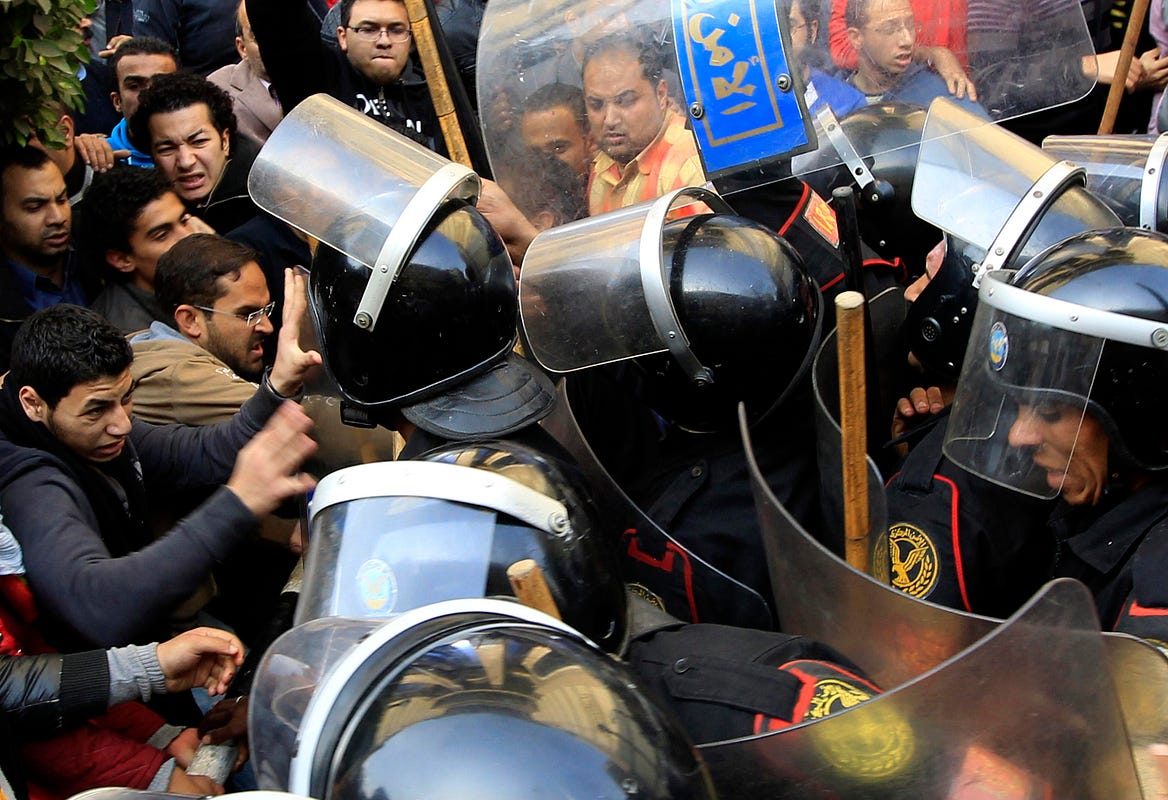 In South Sudan, Pres. Salva Kiir and his former deputy (now enemy) Riek Machar, seem at least prepared to talk to each other but they’re not doing much to stop the violence. The situation in the CAR has spun totally out of control, and both conflicts will continue to dominate the security agenda on the continent for months to come.
In South Sudan, Pres. Salva Kiir and his former deputy (now enemy) Riek Machar, seem at least prepared to talk to each other but they’re not doing much to stop the violence. The situation in the CAR has spun totally out of control, and both conflicts will continue to dominate the security agenda on the continent for months to come.
South Sudan could see a power-sharing agreement being reached relatively quickly, but like the peace agreement between South and North Sudan, any compromise will be very volatile and will need continuous support from important neighbors and the larger international community to succeed.
Even if a peace agreement is reached, low-intensity hostilities are likely to continue in parts of the country, as all parties will be eager to protect their respective spheres of influence.
In the Central African Republic, nobody is even talking about a serious peace agreement, mostly because the conflict parties are much less well defined. The bulk of the violence in the country is occurring between militias—part of the rebel coalition that brought the current government to power—on the one side, and local self-defense groups on the other. The central state has completely collapsed and is unlikely to recover any time soon.
The most realistic path to stability for the CAR will be the deployment of a substantial peacekeeping force comparable to that in neighboring Democratic Republic of the Congo, but it is unclear if the international community is willing to shoulder the costs and risks of such a mission for a country that is comparatively unimportant.
Even if the current contingent of 1,600 French and 2,500 African troops is augmented, it will take months for these forces to deploy and have a discernible effect on the ground. As was the case with Syria, the media interest in the violence committed in the Central African Republic will likely fade as the year 2014 progresses, but the conflict will stay deadly and unresolved for some time to come.
Protest in Egypt. Flickr user oxfamnovid photo
The aftermaths of revolutions: Libya and Egypt
Both Libya and Egypt are children of the Arab Spring—but their experiences could hardly be more opposed. While Libya descended into civil war which resulted in a U.S.-led intervention and the death of dictator Muammar Gaddafi, Egypt’s autocratic former Pres. Hosni Mubarak was ousted more or less peacefully by public protests.
But while Libya has made slow but more or less steady progress on its way out of dictatorship, violence has only increased in Egypt after a standoff between the Muslim Brotherhood, the military and liberal parts of the population led to a de facto military coup.
Mohammed Morsi, elected as president in a generally free and fair election with the support of the Muslim Brotherhood, was removed from office and is under arrest, as are many other members of the Brotherhood’s leadership. The organization itself was officially declared a terrorist organization some days ago and all its assets seized. That brings Egypt back in a full circle to outright military rule, with the small change of commander-in-chief Gen. Abdel Fattah El Sisi taking the place of former air force commander Mubarak.
The Brotherhood still has strong support in some parts of the country, though. The last months have seen protests, sometimes violent, and a worrying tendency towards terrorist attacks. 2014 will likely see a continuation of these trends as well as further conflict on the Sinai, where the military government is battling with local nomads and criminal organizations linked to Hamas in the Gaza Strip.
Egypt’s return to some semblance of normalcy will greatly depend on the readiness of the military to accept some form of compromise with the Muslim Brotherhood. This looks unlikely at the moment.
Libya will likewise see continued instability. The main sticking point? Armed militias which fought in the civil war and refused to disband, and a shift to increasing autonomy in the eastern part of the country. But considering the decades of brutal dictatorship that the country has emerged from, these are issues to be expected and not insurmountable. If handled correctly and with deft support from the international community, 2014 could turn out to be a positive year for Libya
.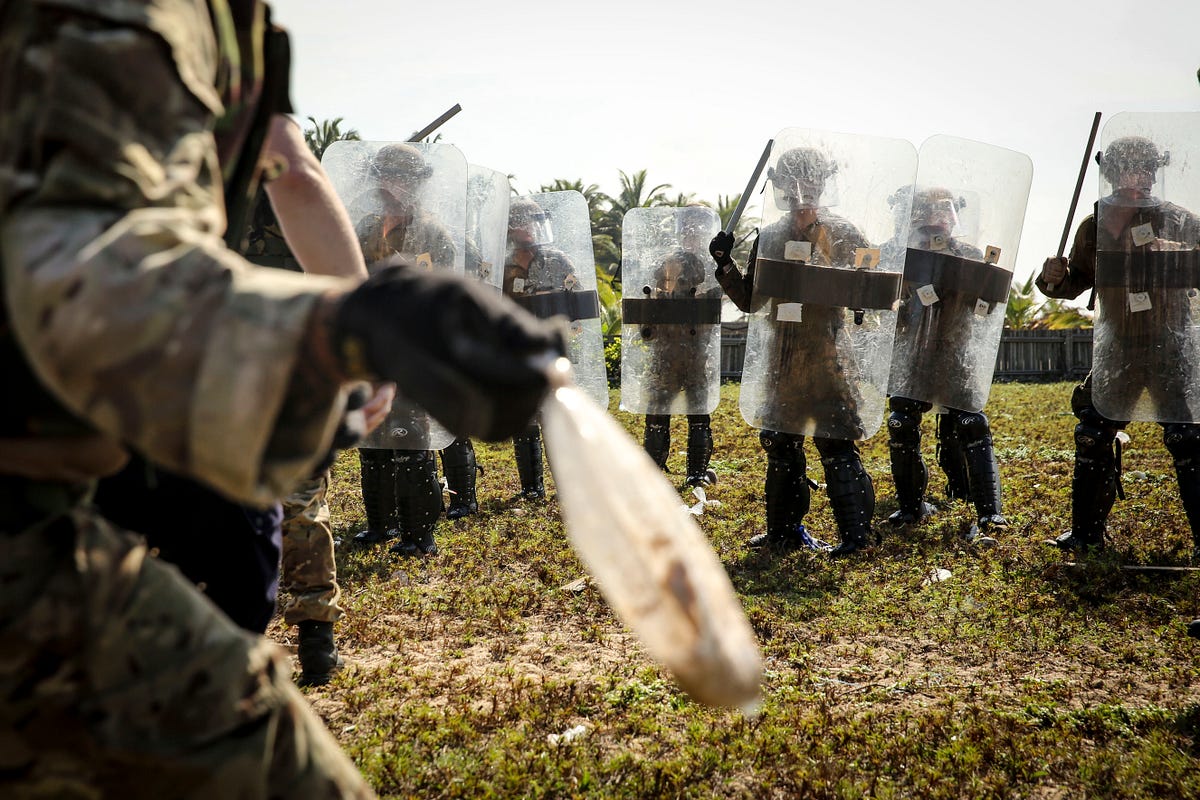 Riot control exercise in Nigeria with U.S. Marines. Marine Corps photo
Riot control exercise in Nigeria with U.S. Marines. Marine Corps photo
 Riot control exercise in Nigeria with U.S. Marines. Marine Corps photo
Riot control exercise in Nigeria with U.S. Marines. Marine Corps photo
The ultimate insurgency: Nigeria
Despite being largely absent from international headlines, Africa’s most entrenched insurgency can be found in northern Nigeria. Centered around the town of Maiduguri, the loose conglomerate of Islamic fundamentalists known colloquially as Boko Haram fights against the Nigerian state.
Attacks like car bombs, Kalashnikov-wielding assailants on motorcycles and impromptu road blocks—and the army’s brutal response to the insurgency—resulted in at least several thousand deaths over the last several years.
In May, the government began its latest offensive against the group, which saw several thousand soldiers supported by tanks and helicopter gunships flood into the states of Borno and Yobe. The army claimed dozens of insurgents killed every week, but the attacks continue. Even army bases are not immune with several large scale attacks reported in recent weeks which killed dozens of soldiers and their relatives.
Boko Haram has been pushed out of population centers to a certain extent, but the organization, which has no discernible central command, has reacted by enlarging its area of operation into neighboring Cameroon, making it a threat to the stability of the entire region.
Despite several earlier offensives comparable to the current one, the Nigerian government has so far proved unable to resolve the conflict by military means. This is unlikely to change. The Nigerian army is overestimating its successes against Boko Haram, and the organization may be too entrenched to be routed out by brute force.
Either way, 2014 will likely see a continuation of the violence and counter-violence with grave cost to civilians.
There’s also politics. Nigeria will have presidential elections in 2015 and the incumbent Pres. Goodluck Jonathan, a Christian southerner, plans to run for another term. In doing so, he violates the informal political compromise that the presidency should rotate between a southerner and a northerner. There are well-documented links between some northern politicians and Boko Haram, and these politicians will likely seek to use violence as a leverage against Jonathan in the run up to the elections.
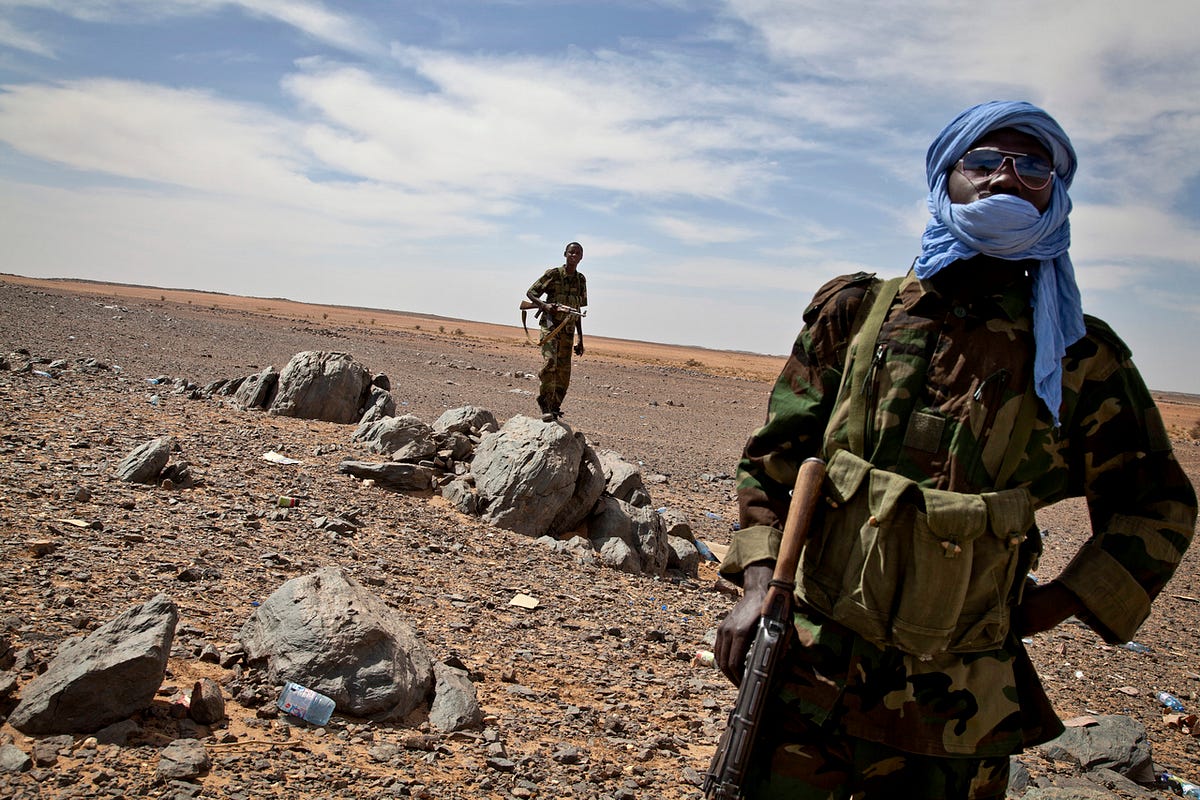 Peacekeepers in Mali. U.N./Marco Dormino photo
Peacekeepers in Mali. U.N./Marco Dormino photo
Islamists and rebels: The Sahel
Despite France rapidly drawing down its troops in Mali and claiming success in its fight against Al Qaeda in the Islamic Maghreb, many questions remain about the security of the wider region.
After Mali—the “role model” for democracy in West Africa—collapsed, analysts started to look more critically at other states in the region. What they saw was not pretty. Ivory Coast, Guinea-Bissau, Guinea, Burkina Faso, Algeria, Mauritania, Niger—they all struggle with some form of internal political instability. Upcoming presidential elections, like in Burkina Faso and Ivory Coast in 2015, will likely exacerbate tensions.
Continued international attention will also limit the potential for larger scale conflicts in Mali in 2014. Both the Malian government and Tuareg rebels will continue to use military means to further their political goals, but thepresence of international troops means that these skirmishes will likely not reach population centers.
Islamist organizations like Al Qaeda in the Islamic Maghreb are also eager to prove their relevance, and could possibly stage at least one attack on a high-value target. The In Amenas attack in Algeria last year is a template for such an attack. In other countries, violence is more likely to be perpetrated by government actors as they strive to strengthen their position amid rising dissent among their populations
.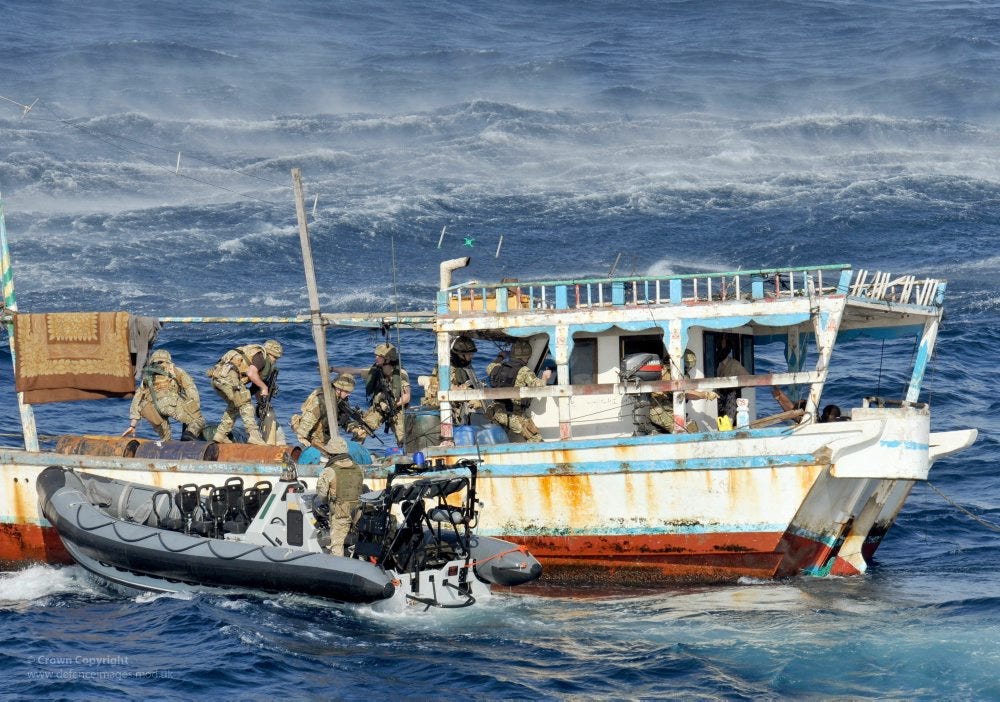 Royal Marines during an anti-piracy operation off the Horn of Africa. British Ministry of Defense photo
Royal Marines during an anti-piracy operation off the Horn of Africa. British Ministry of Defense photo
 Royal Marines during an anti-piracy operation off the Horn of Africa. British Ministry of Defense photo
Royal Marines during an anti-piracy operation off the Horn of Africa. British Ministry of Defense photo
Pirates: West Africa
Somali piracy has been reduced to a shadow of its former glory in the face of a well-established international naval presence. Not a single large vessel was successfully captured off the Somali coast, although there were still regular attacks. If the international community continues to devote considerable resources to fighting piracy off Somalia, this positive trend is likely to continue.
The case is a bit different in West Africa. Incidents of piracy have increased in recent years in the Gulf of Guinea and because of its less spectacular nature—vessels are often abducted for just a few days to steal their cargo—the international community has been slow to respond.
Similar to Somalia, the underlying issues involving West African piracy can be found on land, not on sea.
In the case of the mostly Nigerian pirates, corrupt government officials, incapable security forces and rampant poverty make it easy for prospective pirates to justify and execute their plots. But unlike the Horn of Africa, the Gulf of Guinea doesn't lend itself to the kind of massive marine intervention that has all but swept the Somali pirates from the seas.
Here’s why. Vessels in West Africa are usually attacked when at anchor with minimal time for crew and law enforcement to respond. Pirates are active across the waters of several sovereign states, all of which are uneasy of foreign navies roaming through their territory.
Under these circumstances, piracy in West Africa will likely remain stable or even increase in 2014. The states bordering the Gulf of Guinea and the international community will continue to hold conferences and launch training missions, but these projects will have little impact on the ground. A concerted effort to tackle piracy in the region is still a few years off and depends largely on domestic political developments in several key states, chief among them Nigeria.
Until then, shipping companies will think hard about deploying private armed security forces aboard their ships.
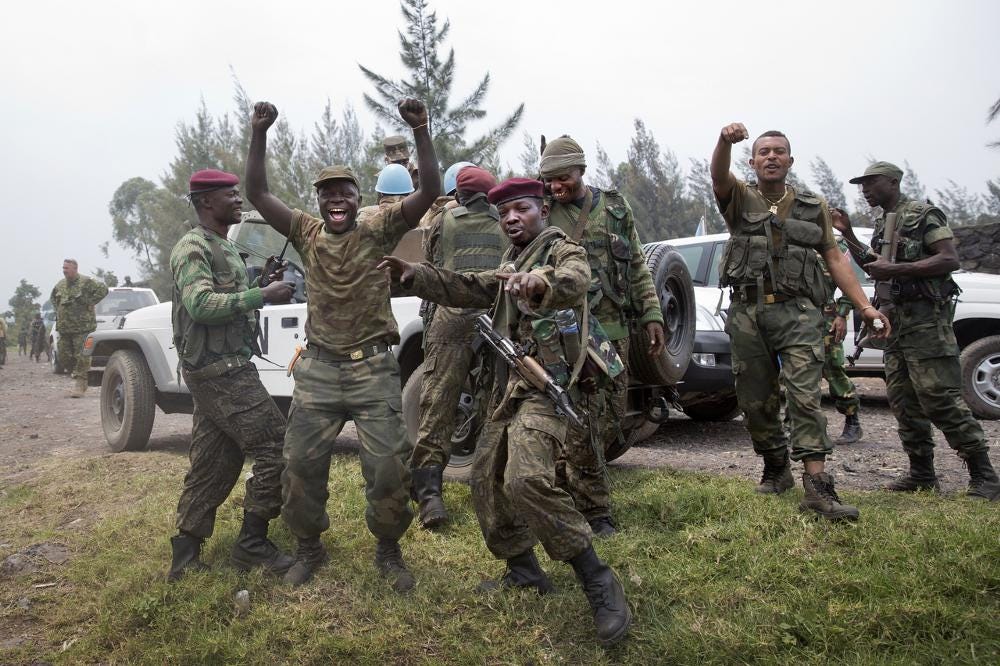 U.N. troops celebrate the defeat of M23 rebels. U.N. photo
U.N. troops celebrate the defeat of M23 rebels. U.N. photo
The silver lining: The Democratic Republic of Congo
The year 2013 ended on a hopeful note for the perennial failed state of the Democratic Republic of the Congo. The M23, the country’s most prolific rebel group was soundly defeated by a newly invigorated army and a force of African peacekeepers.
This had a resounding effect in the eastern part of the country, where some smaller armed groups turned themselves in almost immediately for fear of becoming the next target. For the first time in years there is the real opportunity to transform the conflict and use an improved security situation to make progress on important political and social issues.
This year will show if Congo’s politicians and its military are able to grasp it. A range of entrenched rebel groups remain, among them the Rwandan FDLR, the Ugandan ADF-NALU and the secessionist movement Kata Katanga. The leadership of these groups are unwilling to enter negotiations, and they will likely be prepared for any offensive after witnessing the fate of the M23.
The question remains if Congo’s notoriously scheming politicians will allow the government to establish order in the east and in Katanga. Already, one of the most important commanders in the offensive against the M23 has been killed under questionable circumstances. The attacks by a religious sect on several targets in Kinshasa and Lubumbashi has been attributed by some analysts to the internal power struggles within the regime.
No comments:
Post a Comment